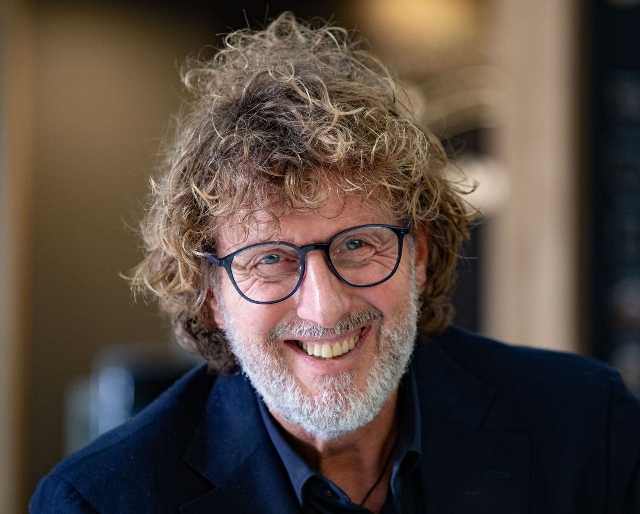MILAN, Italy – Andrea Pozzolini, CEO of Rhea Vendors Group, one of the most important manufacturers in the world regarding tailor-made vending machines, reveals the philosophy of the company in the world of vending. Pozzolini talks about the role of sustainability and quality in fully automatic machines with an induction heating system, focusing on the energy savings achieved thanks to the use of the best technologies.
You have participated in numerous industry events from FHA Horeca in Singapore, to Sigep in Italy, from the first Sigep China in Shenzhen, to Aneda ExpoCongress in Madrid, Paris and you will also be at Host in the autumn. What similarities and differences do you see in the different markets today? How do you manage to meet the different needs?
“Let’s start with the similarities: there is a shared denominator from Singapore to China, from Europe to all the countries to which we export our machines, although with a different speed of learning: it concerns the desire to change the approach to hospitality.
In all areas of hospitality, be it workspaces, retail, hotels, petrol stations, public places or residential, the consumer is looking for the quality of the overall experience. And that is what we offer with our solutions. Rhea has always worked on turning a break into a quality moment.
The differences come from different cultures, for which we have always had great respect. My predecessor, a great man and friend, Carlo Majer, used to say that we are like pianists who must have the ability to interpret music from all over the world. And this has always been the company’s philosophy, which today we define as tailor-made: responding to the demands of different markets by offering tailor-made solutions that respect their local preferences and habits. From the more traditional vending sector, where we started over 60 years ago, we are able to meet the preferences and needs of all market segments worldwide, thanks to our commitment to customization.”
You export all over the world: in what do you feel you represent the Made in Italy?
“In the experience. If a person comes to Italy, they don’t just remember the pizza, but also the way it was served. We have talent for hospitality, we do it differently. We Italians are hospitable by nature. Rhea, with sixty years of experience in this field, is an ambassador of hospitality, always respecting other cultures. Our real strength is to bring recipes that can be tailored to individual societies and consumers.
We cater for local tastes: we aim to offer the coffee that is most liked there. Our ability is to provide a flexible and precise tool that allows you to create your own recipe, that you will then serve and replicate. Design is another value: we bring around the world Italian aesthetic excellence and functionality. Our machines are designed to adapt to the environment in which they are placed and create a hospitality area that is pleasing not only to the palate but also to the eye.”
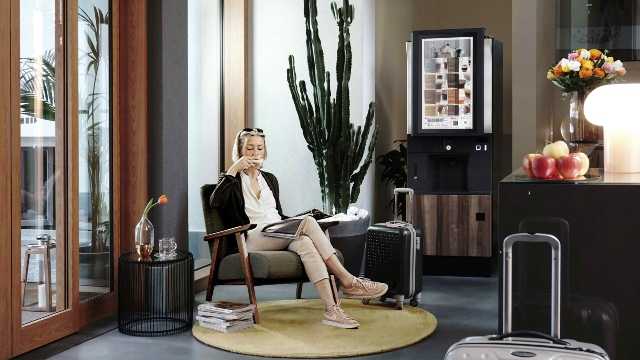
You have been offering super-automatic machines with an induction heating system for some time now: do sustainability and quality go together?
“This is precisely what technology is for: to improve a machine’s ability to make a product. For years, we have focused our machine research and development on Variplus technology, taking into account the three main elements that come into play in brewing a coffee: the grinding, the brewer and the water heating element.
We continue to work on improving this technology, with the aim of delivering the best in-cup result and saving energy. In fact, our Varitherm induction water heating system provides significant energy savings compared to traditional boilers and allows the water temperature to be adapted to individual recipes and to have different temperatures, even within the same beverage.
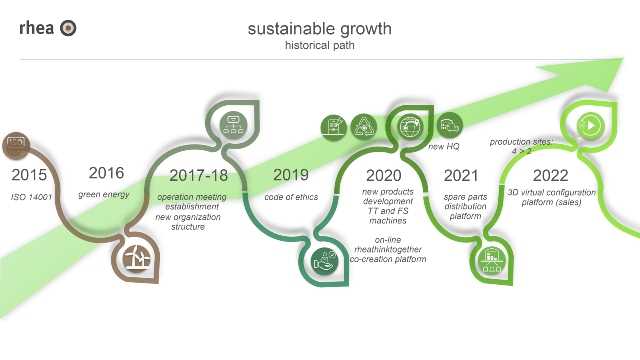
The environmental sustainability aspect is very important to us, and consumers are more aware of being green even when drinking coffee, making sure to consume it within a context that shows concrete actions for recycling and energy saving. Rhea has always put sustainability as a priority. Not only on environmental issues, but also on social and governance ones. Respect for the social context in which we operate and the well-being of those who work in our company is fundamental. That is why we support local realities and have started projects for employees to improve the quality of life in the workplace.”
You have introduced specialty coffee in vending: what are your results on that?
“Today we have reached a level that allows an automatic machine to be set up to also be able to extract specialty coffee, with a quality recognized by experts in the field. At Sigep in Rimini we actually created an event with nine micro specialty roasters and a jury tasting the coffees. It was a success and a confirmation of the potential of our superautomatics. What is the concept behind it? An automatic machine can be set up to make a drink, ensuring that the extraction is customised according to the barista’s ideas.
The advantage is that even someone who is not an expert can press a button and have a cup like the one prepared by a great barista: automation allows you to personalise, and therefore interpret, every single recipe, guaranteeing replicability. We are not thinking of a machine that replaces men, but of a tool that supports him and allows him to always obtain the best possible result.”
What is innovation in the coffee sector?
“If we talk about innovation, we have to focus on the capacity of the machine and the structure of the components which ensure good quality. With this goal in mind, we are working both on improving the mechanical part of the dispensing process and the digital part: the machine’s hardware and software allow for greater potential than simply setting. Innovation for Rhea is guaranteeing replicability of quality, always.
And we are constantly experimenting with new technologies to be put at the service of coffee quality. Today, we are introducing artificial intelligence as it manages and processes information, learning from it to ensure quality growth at all times.”
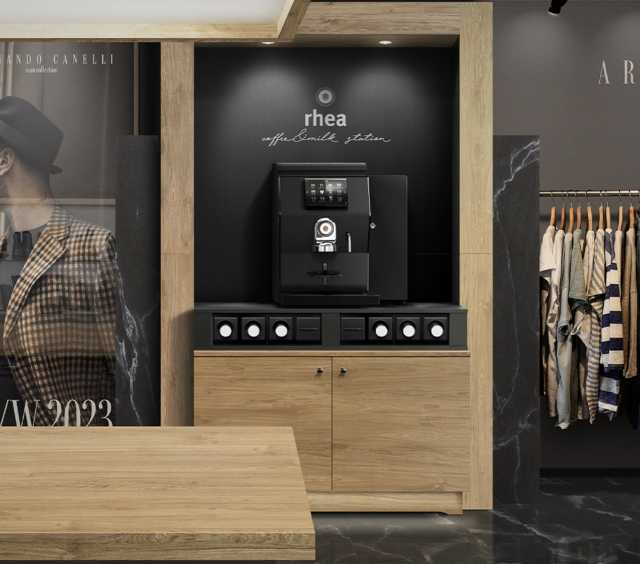
You have made vending accessible to blind people by developing machines suitable for these users.
“A user is more than a customer. In the case of the visually impaired, the project was created to give people with this disability the opportunity to run a business using automatic coffee machines. We did this in China thanks to a collaboration with David Wang, a social worker and founder of Bear Paw Café. In addition to the satisfaction of seeing the smiles on the faces of these young people, this project is part of a concept that we also brought to Sigep and which we called ‘Design for All’.
This means creating a tool that is accessible to everyone, to achieve certain results: for use by a blind person, but also for those who do not have the use of their limbs (we are in fact working on an advanced voice control that will allow even those who do not have manual dexterity to set up the machine). A blind person or one with another disability can make a coffee like a great barista. This is a great goal of ours.”
What are the possible developments Rhea will put in place to accelerate a sector still suffering from the pandemic effects?
“For us it is the continuous improvement of technology. We are working a lot on the sustainability of materials and on the architecture of the machines, so that when they are finally scrapped they can be reassembled by separating the recyclable parts (plastics, metals) easily, without creating hybrid situations of undifferentiated waste. We are working on polymers, looking for solutions that can be compatible with food regulations, but with more sustainable characteristics. We already use recycled materials.
Digital technology also makes it possible to increase controls, the machine’s sensors, and its ability to interact with the user and the operator, not only through telemetry, but by communicating the need for scheduled maintenance based on dynamic statistics. The machine warns when and how to take action, saving time and improving the efficiency and productivity of the machine itself.
This is the goal of all our innovation projects: more efficient equipment, capable of maintaining a constant level of quality, with maintenance that can be carried out mostly remotely, and optimization of ordinary and extraordinary maintenance, to better manage the tool’s ability to perform its daily function, thus reducing wear and tear.
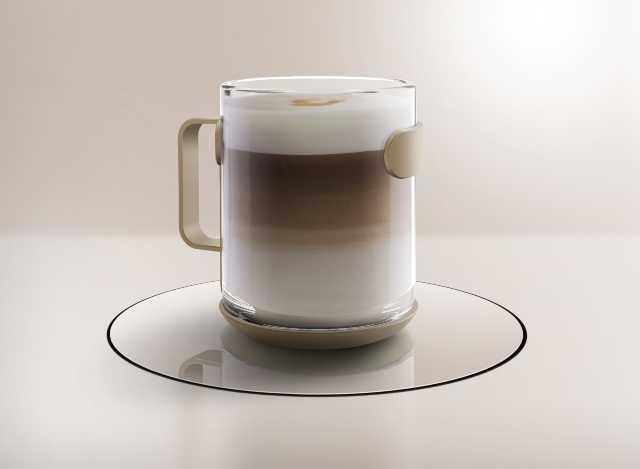
Our idea of the perfect machine is one which produces, helps, is efficient, maintains consistent quality guaranteed by the set-up and understands and satisfies consumer demands.”
Can we conclude by saying that the future of automatic coffee machines and vending machines is already here?
“Yes, but we have to define “here”. While in Italy there are still prejudices to overcome, vending abroad experiences a different condition. Digital technology and its applications on coffee machines are put to better use. In China we have seen realities where, thanks to vending machines, you can even buy theatre tickets. We strongly believe in the alliance of coffee break and experience. With Kairos, our concept machine created for Rhea’s 60th anniversary, we have created a multi-sensory experience to fill the moment when one stops, in the midst of a hectic day, to drink a coffee while distracting oneself, stimulating all the senses, combining them with taste.
By working on innovation, design, customisation and quality, we really want to continue improving the coffee experience through automatic distribution. And it is not only about quality, but also about attention to places of consumption. A coffee served in the underground has a specific need, in terms of speed, that must be different from what is offered in an office, coffee shop or coworking space. Vending has to adapt to the revolution and evolution of the social context to create new consumption experiences and, at the same time, new business opportunities.”




